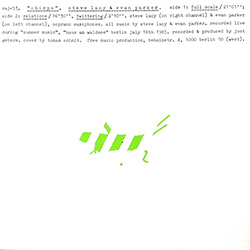
The first reissue in three decades of the 1985 SAJ Series FMP album bringing together legendary saxophonists Steve Lacy and Evan Parker, both on soprano saxophone, for two extended improvisations of magnificent reed interactions and a final coda, performed live during Summer Music at Haus am Waldsee, in Berlin, 1985; an essential album of masterful musicianship.
In Stock
Quantity in Basket: None
Log In to use our Wish List
Shipping Weight: 3.00 units
EU & UK Customers:
Discogs.com can handle your VAT payments
So please order through Discogs
Sample The Album:
Steve Lacy-soprano saxophone
Evan Parker-soprano saxophone
Click an artist name above to see in-stock items for that artist.
Limited edition of 500 copies.
UPC: B0B7P8CZRX
Label: Corbett vs. Dempsey
Catalog ID: CvsDCD095
Squidco Product Code: 32239
Format: CD
Condition: New
Released: 2022
Country: USA
Packaging: Cardboard Gatefold
Recorded live during Summer Music, at Haus am Waldsee, in Berlin, Germany, on July 18th, 1985, by Jost Gebers. Originally released in 1986 as a vinyl LP on the German FMP label with catalog code SAJ-53.
"What could possibly happen when two ultimate masters of soprano saxophone square off for their only recording of duets? Chirps is the only place to find out.
Steve Lacy - the one who planted the flag for soprano saxophone in the ground of modern jazz, who established its iconic status, who devoted himself to the axe with monkish devotion, who brought shakuhachi breath and stairstep melody into its upper-register antics.
Evan Parker - arguably the one who pushed the instrument the furthest post-Coltrane, the technical marvel, the polyphonist, the one willing to immerse in the instrument's harshest environs and find things of radiant beauty.
Performed in Berlin at the Haus am Waldsee in July, 1985, it was every bit the chamber concert - super intimate and interactive, gorgeously recorded by FMP's Jost Gebers in an ideal acoustic room. Rather than alternate between one and the other, Lacy and Parker explore middle-terrain the whole time, perhaps skewing a tad more Lacy's funky-tuneful direction, becoming a single soprano entity made of fragments of sound sometimes accreting into perfectly imperfect lines.
Two long tracks, "Full Scale" and "Relations," are completed by a final four-minute coda aptly titled "Twittering." Indeed, the whole program has the joyous interactivity of Paul Klee's painting "Twittering Machine," birds aligned on a line, proposing and picking up lines, nothing cruel or mean-spirited, free play all a graceful twitter.
This CD reissue restores the original Tomas Schmit design from the initial release on SAJ Records. Licensed directly from FMP."-Corbett Vs. Dempsey
Limited edition of 500 copies.
Artist Biographies
• Show Bio for Steve Lacy "Steve Lacy (July 23, 1934 - June 4, 2004), born Steven Norman Lackritz in New York City, was a jazz saxophonist and composer recognized as one of the important players of soprano saxophone. Coming to prominence in the 1950s as a progressive dixieland musician, Lacy went on to a long and prolific career. He worked extensively in experimental jazz and to a lesser extent in free improvisation, but Lacy's music was typically melodic and tightly-structured. Lacy also became a highly distinctive composer, with compositions often built out of little more than a single questioning phrase, repeated several times. The music of Thelonious Monk became a permanent part of Lacy's repertoire after a stint in the pianist's band, with Monk's songs appearing on virtually every Lacy album and concert program; Lacy often partnered with trombonist Roswell Rudd in exploring Monk's work. Beyond Monk, Lacy performed the work of jazz composers such as Charles Mingus, Duke Ellington and Herbie Nichols; unlike many jazz musicians he rarely played standard popular or show tunes. Lacy began his career at sixteen playing Dixieland music with much older musicians such as Henry "Red" Allen, Pee Wee Russell, George "Pops" Foster and Zutty Singleton and then with Kansas City jazz players like Buck Clayton, Dicky Wells, and Jimmy Rushing. He then became involved with the avant-garde, performing on Jazz Advance (1956), the debut album of Cecil Taylor,:55 and appearing with Taylor's groundbreaking quartet at the 1957 Newport Jazz Festival; he also made a notable appearance on an early Gil Evans album. His most enduring relationship, however, was with the music of Thelonious Monk: he recorded the first album to feature only Monk compositions (Reflections, Prestige, 1958) and briefly played in Monk's band in 1960:241 and later on Monk's Big Band and Quartet in Concert album (Columbia, 1963). Lacy's first visit to Europe came in 1965, with a visit to Copenhagen in the company of Kenny Drew; he went to Italy and formed a quartet with Italian trumpeter Enrico Rava and the South African musicians Johnny Dyani and Louis Moholo (their visit to Buenos Aires is documented on The Forest and the Zoo, ESP, 1967). After a brief return to New York, he returned to Italy, then in 1970 moved to Paris, where he lived until the last two years of his life. He became a widely respected figure on the European jazz scene, though he remained less well known in the U.S. The core of Lacy's activities from the 1970s to the 1990s was his sextet: his wife, singer/violinist Irene Aebi,:272 soprano/alto saxophonist Steve Potts, pianist Bobby Few, bassist Jean-Jacques Avenel, and drummer Oliver Johnson (later John Betsch). Sometimes this group was scaled up to a large ensemble (e.g. Vespers, Soul Note, 1993, which added Ricky Ford on tenor sax and Tom Varner on French horn), sometimes pared down to a quartet, trio, or even a two-saxophone duo. He played duos with pianist Eric Watson. Lacy also, beginning in the 1970s, became a specialist in solo saxophone; he ranks with Sonny Rollins, Anthony Braxton, Evan Parker, and Lol Coxhill in the development of this demanding form of improvisation. Lacy was interested in all the arts: the visual arts and poetry in particular became important sources for him. Collaborating with painters and dancers in multimedia projects, he made musical settings of his favourite writers: Robert Creeley, Samuel Beckett, Tom Raworth, Taslima Nasrin, Herman Melville, Brion Gysin and other Beat writers, including settings for the Tao Te Ching and haiku poetry. As Creeley noted in the Poetry Project Newsletter, "There's no way simply to make clear how particular Steve Lacy was to poets or how much he can now teach them by fact of his own practice and example. No one was ever more generous or perceptive." In 1992, he was the recipient of a MacArthur Fellowship (nicknamed the "genius grant"). He also collaborated with a wide range of musicians, from traditional jazz to the avant-garde to contemporary classical music. Outside of his regular sextet, his most regular collaborator was pianist Mal Waldron,:244-245 with whom he recorded a number of duet albums (notably Sempre Amore, a collection of Ellington/Strayhorn material, Soul Note, 1987). Lacy played his 'farewell concerts to Europe' in Belgium, in duo and solo, for a small but motivated public. This happened in Brussels, Antwerp, Ghent, Bruge and Bergen. This recollection is published by Naked Music. In Ghent he played with the classical violinist Mikhail Bezverkhni, winner of Queen Elisabeth Concours. He returned to the United States in 2002, where he began teaching at the New England Conservatory of Music in Boston, Massachusetts. One of his last public performances was in front of 25,000 people at the close of a peace rally on Boston Common in March 2003, shortly before the US-led invasion of Iraq. After Lacy was diagnosed with cancer in August 2003, he continued playing and teaching until weeks before his death on June 4, 2004 at the age of 69." ^ Hide Bio for Steve Lacy • Show Bio for Evan Parker "Evan Parker was born in Bristol in 1944 and began to play the saxophone at the age of 14. Initially he played alto and was an admirer of Paul Desmond; by 1960 he had switched to tenor and soprano, following the example of John Coltrane, a major influence who, he would later say, determined "my choice of everything". In 1962 he went to Birmingham University to study botany but a trip to New York, where he heard the Cecil Taylor trio (with Jimmy Lyons and Sunny Murray), prompted a change of mind. What he heard was "music of a strength and intensity to mark me for life ... l came back with my academic ambitions in tatters and a desperate dream of a life playing that kind of music - 'free jazz' they called it then." Parker stayed in Birmingham for a time, often playing with pianist Howard Riley. In 1966 he moved to London, became a frequent visitor to the Little Theatre Club, centre of the city's emerging free jazz scene, and was soon invited by drummer John Stevens to join the innovative Spontaneous Music Ensemble which was experimenting with new kinds of group improvisation. Parker's first issued recording was SME's 1968 Karyobin, with a line-up of Parker, Stevens, Derek Bailey, Dave Holland and Kenny Wheeler. Parker remained in SME through various fluctuating line-ups - at one point it comprised a duo of Stevens and himself - but the late 1960s also saw him involved in a number of other fruitful associations. He began a long-standing partnership with guitarist Bailey, with whom he formed the Music Improvisation Company and, in 1970, co-founded Incus Records. (Tony Oxley, in whose sextet Parker was then playing, was a third co-founder; Parker left Incus in the mid-1980s.) Another important connection was with the bassist Peter Kowald who introduced Parker to the German free jazz scene. This led to him playing on Peter Brötzmann's 1968 Machine Gun, Manfred Schoof's 1969 European Echoes and, in 1970, joining pianist Alex von Schlippenbach and percussionist Paul Lovens in the former's trio, of which he is still a member: their recordings include Pakistani Pomade, Three Nails Left, Detto Fra Di Noi, Elf Bagatellen and Physics. Parker pursued other European links, too, playing in the Pierre Favre Quartet (with Kowald and Swiss pianist Irene Schweizer) and in the Dutch Instant Composers Pool of Misha Mengelberg and Han Bennink. The different approaches to free jazz he encountered proved both a challenging and a rewarding experience. He later recalled that the German musicians favoured a "robust, energy-based thing, not to do with delicacy or detailed listening but to do with a kind of spirit-raising, a shamanistic intensity. And l had to find a way of surviving in the heat of that atmosphere ... But after a while those contexts became more interchangeable and more people were involved in the interactions, so all kinds of hybrid musics came out, all kinds of combinations of styles." A vital catalyst for these interactions were the large ensembles in which Parker participated in the 1970s: Schlippenbach's Globe Unity Orchestra, Chris McGregor's Brotherhood of Breath, Barry Guy's London Jazz Composers Orchestra (LJCO) and occasional big bands led by Kenny Wheeler. In the late 70s Parker also worked for a time in Wheeler's small group, recording Around Six and, in 1980, he formed his own trio with Guy and LJCO percussionist Paul Lytton (with whom he had already been working in a duo for nearly a decade). This group, together with the Schlippenbach trio, remains one of Parker's top musical priorities: their recordings include Tracks, Atlanta, Imaginary Values, Breaths and Heartbeats, The Redwood Sessions and At the Vortex. In 1980, Parker directed an Improvisers Symposium in Pisa and, in 1981, he organised a special project at London's Actual Festival. By the end of the 1980s he had played in most European countries and had made various tours to the USA, Canada, Australia, New Zealand and Japan. ln 1990, following the death of Chris McGregor, he was instrumental in organising various tributes to the pianist and his fellow Blue Notes; these included two discs by the Dedication Orchestra, Spirits Rejoice and lxesa. Though he has worked extensively in both large and small ensembles, Parker is perhaps best known for his solo soprano saxophone music, a singular body of work that in recent years has centred around his continuing exploration of techniques such as circular breathing, split tonguing, overblowing, multiphonics and cross-pattern fingering. These are technical devices, yet Parker's use of them is, he says, less analytical than intuitive; he has likened performing his solo work to entering a kind of trance-state. The resulting music is certainly hypnotic, an uninterrupted flow of snaky, densely-textured sound that Parker has described as "the illusion of polyphony". Many listeners have indeed found it hard to credit that one man can create such intricate, complex music in real time. Parker's first solo recordings, made in 1974, were reissued on the Saxophone Solos CD in 1995; more recent examples are Conic Sections and Process and Reality, on the latter of which he does, for the first time, experiment with multi-tracking. Heard alone on stage, few would disagree with writer Steve Lake that "There is, still, nothing else in music - jazz or otherwise - that remotely resembles an Evan Parker solo concert." While free improvisation has been Parker's main area of activity over the last three decades, he has also found time for other musical pursuits: he has played in 'popular' contexts with Annette Peacock, Scott Walker and the Charlie Watts big band; he has performed notated pieces by Gavin Bryars, Michael Nyman and Frederic Rzewski; he has written knowledgeably about various ethnic musics in Resonance magazine. A relatively new field of interest for Parker is improvising with live electronics, a dialogue he first documented on the 1990 Hall of Mirrors CD with Walter Prati. Later experiments with electronics in the context of larger ensembles have included the Synergetics - Phonomanie III project at Ullrichsberg in 1993 and concerts by the new EP2 (Evan Parker Electronic Project) in Berlin, Nancy and at the 1995 Stockholm Electronic Music Festival where Parker's regular trio improvised with real-time electronics processed by Prati, Marco Vecchi and Phillip Wachsmann. "Each of the acoustic instrumentalists has an electronic 'shadow' who tracks him and feeds a modified version of his output back to the real-time flow of the music." The late 80s and 90s brought Parker the chance to play with some of his early heroes. He worked with Cecil Taylor in small and large groups, played with Coltrane percussionist Rashied Ali, recorded with Paul Bley: he also played a solo set as support to Ornette Coleman when Skies of America received its UK premiere in 1988. The same period found Parker renewing his acquaintance with American colleagues such as Anthony Braxton, Steve Lacy and George Lewis, with all of whom he had played in the 1970s (often in the context of London's Company festivals). His 1993 duo concert with Braxton moved John Fordham in The Guardian to raptures over "saxophone improvisation of an intensity, virtuosity, drama and balance to tax the memory for comparison". Parker's 50th birthday in 1994 brought celebratory concerts in several cities, including London, New York and Chicago. The London performance, featuring the Parker and Schlippenbach trios, was issued on a highly-acclaimed two-CD set, while participants at the American concerts included various old friends as well as more recent collaborators in Borah Bergman and Joe Lovano. The NYC radio station WKCR marked the occasion by playing five days of Parker recordings. 1994 also saw the publication of the Evan Parker Discography, compiled by ltalian writer Francesco Martinelli, plus chapters on Parker in books on contemporary musics by John Corbett and Graham Lock. Parker's future plans involve exploring further possibilities in electronics and the development of his solo music. They also depend to a large degree on continuity of the trios, of the large ensembles, of his more occasional yet still long-standing associations with that pool of musicians to whose work he remains attracted. This attraction, he explained to Coda's Laurence Svirchev, is attributable to "the personal quality of an individual voice". The players to whom he is drawn "have a language which is coherent, that is, you know who the participants are. At the same time, their language is flexible enough that they can make sense of playing with each other ... l like people who can do that, who have an intensity of purpose." " ^ Hide Bio for Evan Parker
7/9/2025
Have a better biography or biography source? Please Contact Us so that we can update this biography.
7/9/2025
Have a better biography or biography source? Please Contact Us so that we can update this biography.
Track Listing:
1. Full Scale 21:01
2. Relations 16:30
3. Twittering 4:10
Improvised Music
Jazz
Free Improvisation
European Improvisation, Composition and Experimental Forms
London & UK Improv & Related Scenes
Lacy, Steve
Parker, Evan
Jazz Reissues
Staff Picks & Recommended Items
New in Improvised Music
Top Sellers for 2022 by Customer Sales
Search for other titles on the label:
Corbett vs. Dempsey.


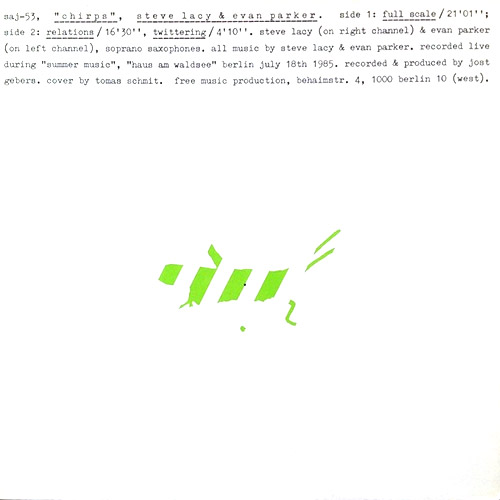


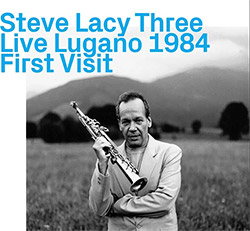


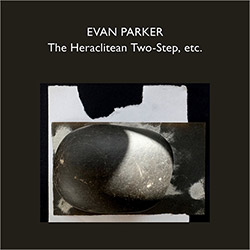

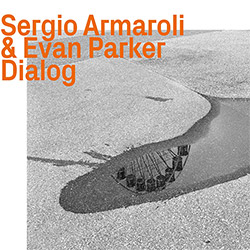

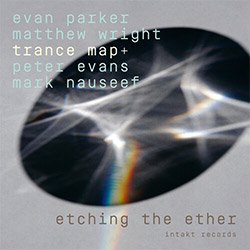


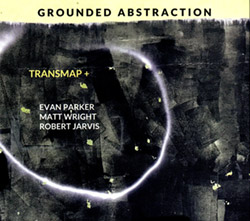
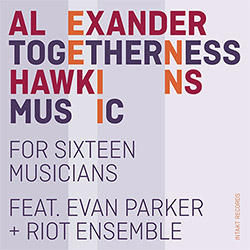
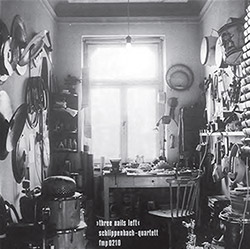
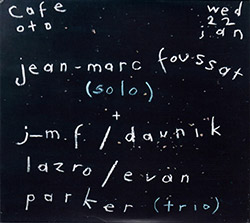


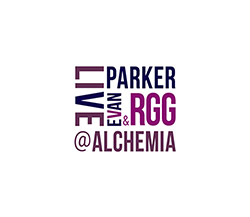

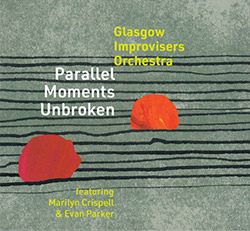









![BlueRing Improvisers: Materia [2 CDs]](https://www.teuthida.com/productImages/misc4/36513.jpg)








![Wheelhouse (Rempis / Adasiewicz / McBride): House And Home [VINYL]](https://www.teuthida.com/productImages/misc4/36462.jpg)
![+DOG+: The Light Of Our Lives [2 CDs]](https://www.teuthida.com/productImages/misc4/36009.jpg)












![Deupree, Jerome / Sylvie Courvoisier / Lester St. Louis / Joe Morris: Canyon [2 CDs]](https://www.teuthida.com/productImages/misc4/36404.jpg)



![Eventless Plot | Haarvol: The Subliminal Paths [CASSETTE + DOWNLOAD]](https://www.teuthida.com/productImages/misc4/36232.jpg)










![Eventless Plot | Francesco Covarino: Methexis [CASSETTE + DOWNLOAD]](https://www.teuthida.com/productImages/misc4/36231.jpg)



![Das B (Mazen Kerbaj / Mike Majkowski / Magda Mayas / Tony Buck): Love [VINYL]](https://www.teuthida.com/productImages/misc4/36329.jpg)


![Eternities: Rides Again [CASSETTE]](https://www.teuthida.com/productImages/misc4/36247.jpg)
![Lopez, Francisco: Untitled (2021-2022) [2 CDs]](https://www.teuthida.com/productImages/misc4/36438.jpg)






![Money : Money 2 [2 CDs]](https://www.teuthida.com/productImages/misc4/35894.jpg)




![Klinga, Erik: Elusive Shimmer [VINYL]](https://www.teuthida.com/productImages/misc4/36258.jpg)
![CHANGES TO blind (Phil Zampino): Volume 9 - I Wave on a Fine Vile Mist [CD + DOWNLOAD]](https://www.teuthida.com/productImages/misc4/36061.jpg)

![Wallmart / Rubbish: Asset Protection [split CD]](https://www.teuthida.com/productImages/misc4/35900.jpg)


![+Dog+: The Family Music Book Vol. 5 [2 CDs]](https://www.teuthida.com/productImages/misc4/35897.jpg)
![Kuvveti, Deli : Kuslar Soyledi [CASSETTE w/ DOWNLOAD]](https://www.teuthida.com/productImages/misc4/36107.jpg)

![Brown, Dan / Dan Reynolds: Live At The Grange Hall [unauthorized][CASSETTE]](https://www.teuthida.com/productImages/misc4/36245.jpg)








![Palestine, Charlemagne / Seppe Gebruers: Beyondddddd The Notessssss [VINYL]](https://www.teuthida.com/productImages/misc4/36206.jpg)
![Palestine, Charlemagne / Seppe Gebruers: Beyondddddd The Notessssss [NEON GREEN VINYL]](https://www.teuthida.com/productImages/misc4/36207.jpg)

![Laubrock, Ingrid: Purposing The Air [2 CDs]](https://www.teuthida.com/productImages/misc4/35639.jpg)

![Yoko, Ono / The Great Learning Orchestra: Selected Recordings From Grapefruit [2 CDs]](https://www.teuthida.com/productImages/misc4/35841.jpg)









![Zorn, John / JACK Quartet: The Complete String Quartets [2 CDs]](https://www.teuthida.com/productImages/misc4/35609.jpg)

![Lonsdale, Eden: Dawnings [2 CDs]](https://www.teuthida.com/productImages/misc4/35480.jpg)



![Sorry For Laughing (G. Whitlow / M. Bates / Dave-Id / E. Ka-Spel): Rain Flowers [2 CDS]](https://www.teuthida.com/productImages/misc4/35985.jpg)

![Rolando, Tommaso / Andy Moor : Biscotti [CASSETTE w/ DOWNLOADS]](https://www.teuthida.com/productImages/misc4/36106.jpg)


![Electric Bird Noise / Derek Roddy: 8-10-22 [CD EP]](https://www.teuthida.com/productImages/misc4/35970.jpg)








![Elephant9 : Mythical River [VINYL]](https://www.teuthida.com/productImages/misc4/34624.jpg)



![Elephant9 with Terje Rypdal: Catching Fire [VINYL 2 LPs]](https://www.teuthida.com/productImages/misc4/35355.jpg)
![Deerlady (Obomsawin, Mali / Magdalena Abrego): Greatest Hits [VINYL]](https://www.teuthida.com/productImages/misc4/34876.jpg)







![Surplus 1980: Illusion of Consistency [CD]](https://www.teuthida.com/productImages/misc4/35069.jpg)
![Staiano, Moe: Away Towards the Light [VINYL + DOWNLOAD]](https://www.teuthida.com/productImages/misc4/35037.jpg)
![Coley, Byron: Dating Tips for Touring Bands [VINYL]](https://www.teuthida.com/productImages/misc4/17906.jpg)

![Lost Kisses: My Life is Sad & Funny [DVD]](https://www.teuthida.com/productImages/misc4/lostKissesDVD.jpg)